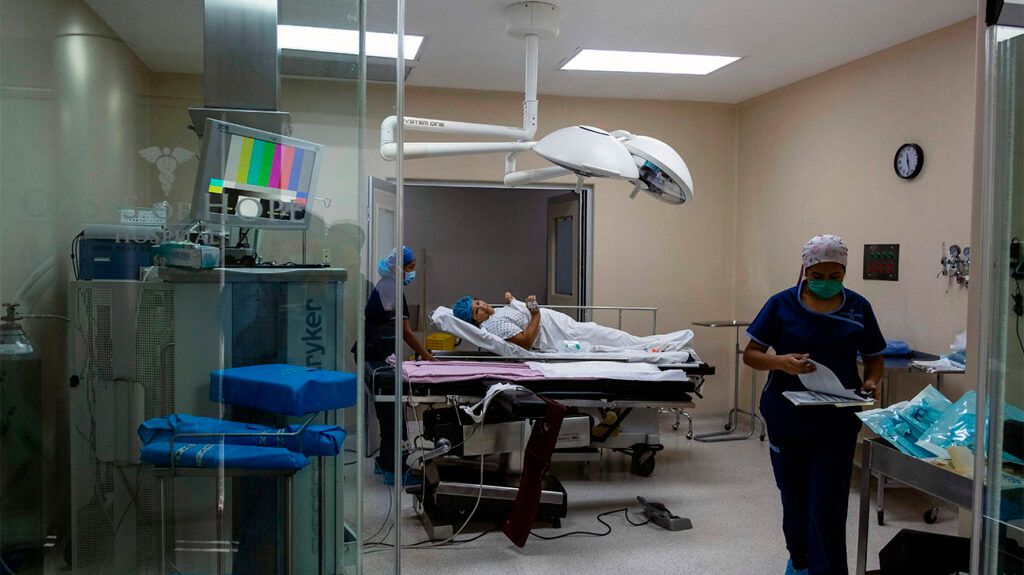
- Researchers say bariatric surgery can significantly improve cardiometabolic functions, such as blood pressure, cholesterol, glucose, and HbA1c.
- They say people who lose weight lower their risk of developing type 2 diabetes, hypertension, and dyslipidemia as well as improving their overall 10-year heart disease risk.
- The researchers noted that between 30% and 50% of people who had bariatric surgery experienced remission of diabetes, hypertension, and dyslipidemia.
Bariatric surgery may result in significant cardiometabolic improvements, particularly among younger, female, or white people and those without co-morbidities, according to new research published in the Journal of the Endocrine Society.
In their study, researchers evaluated more than 7,800 people between the ages of 20 and 79 who underwent bariatric surgery.
Most participants were white and female, but the researchers noted there was also a significant number of male and Black individuals, a group typically underrepresented in bariatric surgery research.
The scientists looked for cardiometabolic improvements, such as:
They also measured remission rates of diabetes, hypertension, and dyslipidemia and estimated the 10-year cardiovascular disease risk.
The researchers reported that older, male, and Black study participants showed a minor reduction in 10-year heart disease risk and had lower odds of diabetes, hypertension, and dyslipidemia remission than younger, female, or white participants.
Participants with a history of these diseases also showed less cardiometabolic improvements than those without.
“I believe the researchers had a small sample size of older Black males and to come to firm conclusions, we would need a larger sample size,” said Dr. Mir Ali, a bariatric surgeon and medical director of MemorialCare Surgical Weight Loss Center at Orange Coast Medical Center in California who was not involved in the study. “That said, I do believe genetic factors can contribute to obesity and Black people have more genetic factors for obesity.”
“Despite that, I still suggest surgery for older Black males,” Ali told Medical News Today. “Bariatric surgery is still the far best way to lose weight and there were improvements in cardiometabolic health – just not as much as the younger, white group.”
The study authors noted that:
- Bariatric surgery leads to significant weight loss and improves heart health, including lower blood pressure, lipids, and blood sugar.
- Bariatric surgery participants had an estimated 35% reduction in their 10-year cardiovascular risk one year after their surgery.
- Between 30% and 50% of people who had bariatric surgery experienced remission of diabetes, hypertension, and dyslipidemia.
- Younger, female, and white participants with no history of cardiometabolic disease saw the most significant post-surgery cardiometabolic improvements.
“Bariatric surgery is a tool that makes eating less, eating healthier foods, and activity more feasible,” said Dr. Mitchell Roslin, the chief of bariatric surgery at Northwell Lenox Hill Hospital in New York who was not involved in the study. “It is still going to be subject to socioeconomic factors and the environment and stresses people face.”
“Severe obesity is deadly,” Roslin told Medical News Today. “It creates a phase change. Thus, people’s bodies are 10 to 20 years older than their chronological age. Heart disease is the biggest killer. Bariatric surgery slows the clock and helps restore someone closer to their real age.”
The term bariatric surgery encompasses different types of treatments for obesity:
- Sleeve gastrectomy – During a sleeve gastrectomy, about 80% of the stomach is removed, according to the
National Institutes of Health . This causes a feeling of fullness for several hours after eating a small meal. The average weight loss five years after the surgery is about 60% of excess weight. - Gastric bypass – During this surgery, there are changes to the stomach and intestines. The stomach is made smaller and the digestive process bypasses a portion of the small intestine. This limits the calories and nutrients your body absorbs, according to UCLA Health. As with the gastric sleeve, individuals feel full on a smaller amount of food, feel full longer, and are not as hungry. Research shows that 20 years after surgery, most patients retain 50% of their excess weight loss.
Weight loss surgery alters the stomach’s anatomy to reduce the amount of food eaten and digested, according to Yale Medicine. It can also improve and sometimes reverse obesity-related conditions such as diabetes, high cholesterol, high blood pressure, sleep apnea, and chronic pain, especially in the hips and knees.
“Bariatric surgery is a major surgery to help people lose weight, but it leads to more than just weight loss,” Ali said. “There are metabolic changes that occur after surgery, such as changes in hormones that could contribute to obesity and heart health. The current study explores this, but much research is still going on to help us better understand it.”
“It is important for people to understand that bariatric surgery and the new weight loss medications are tools to help people change,” he added. “Adjusting eating and lifestyle habits is essential for long-term success.”
